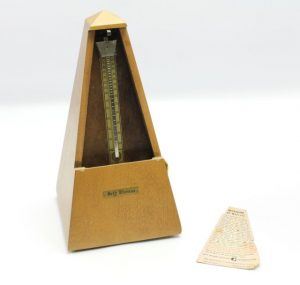by Christopher Bacas

I stayed out late the night before I left for college, saying goodbye to friends whose future included institutions even more punitive than mine. My parents packed my belongings in two long, green army duffel bags purchased at “Sunny’s Surplus”, where you could buy Afro picks with folding handles, decommissioned grenades and a “knuckle knife”.
At Baltimore-Washington airport, I watched a young man carrying a black-leather trumpet case unload his luggage from a Rolls Royce. My parents thought he might be going to school with me. I doubted them. My throat burnt by cheap Mexican weed, trumpet kid looked as sullen as I felt. He boarded with me and we flew southwest. At Dallas-Fort Worth, we both headed to the baggage carousels, still avoiding eye contact. The area gradually cleared, leaving a cluster of freshman music students. A saxophonist unpacked a gleaming Yamaha alto and played scales with a windup, wooden metronome. He began them slowly and evenly, a proper music lesson, and ended each with a monsoon of notes whose velocity propelled his body backwards, a cephalopod in flight.
A few of us took out the letters promising shuttle bus service to our dorm in Denton. At the curb, unmarked vans pulled in, waited and left, sometimes without picking up passengers. They drove through a lattice of Texas sun and graphite shadow. It was one-hundred and fourteen degrees.
We agreed someone should flag down a driver. Annette, a spunky blond woman with a thick New England accent, volunteered. We watched her approach idling vehicles, brandishing the letter. Her report: no one knew about our van, but they could take us for 200$ cash, paid now. As more vans pulled in, a driver reluctantly approached. He seemed surprised at our number and balked at our belongings. After a feverish radio call he agreed to try. We dragged our stuff to the curb and watched him struggle to load and arrange. Heat poured over us, an invisible pressure hose, soaking everything. The driver hoisted my duffel bags to the roof and unspooled rope to tie them. When he added Annette’s saxophone to the rooftop, she took it down. Despite his frustration, no one let him put anything musical on the roof. To save space, we jammed instruments between our legs.
The driver started the engine and pulled away. Instantly, a radio blared: Zeppelin and Southern rock, music I once enjoyed. I watched the driver nudge up the volume. Probably so couldn’t hear us talk. It was hotter in the van than curbside. A dashboard fan circulated fetid air. Side windows opened a few inches. The driver kept his window shut. We sat shoulder to shoulder, our knees locked around cases. Sweat tickled my calves and pooled at my heels. I leaned over, miserable and exhausted. The road shimmered ahead as we wound toward the exit. On our descent to the highway, Yamaha alto guy bolted from his seat.
“Wait! Wait! We have to go back. We have to go back. I forgot my metronome. I left it at baggage claim.”
He was shouting, face flushed and wet. We all looked at him. After so much silence, first awkward, then angry, all our voices started simultaneously, high polyphony:
“It’s just a metronome”
“Call the airport, they’ll find it”
“No. No. No. We’re not going back.!”
The driver pulled over and turned the music down.
“It’s so hot, go back yourself.”
“You can buy another metronome”
“We’re not going back. It’s another hour.”
“Forget it. Forget about it.”
He shouted over us:
“I need my metronome. It was a gift. I can’t leave it there. I have to get it!”
Someone tried to interrupt him. His feral, cracked voice pulled the last bit of oxygen out of the van.
“No! I have to get it now! I’m sorry. I’m sorry.”
Alto guy convinced the driver. What followed: repeated apologies, blasting radio, waiting in an inferno. Once he returned with the metronome, we each boarded lifeboats, drifting into defeated silence.
Denton was a couple degrees cooler than the airport. It was a relief to get out of the van, too. Our driver fumbled with the ropes, probably because the roof frame was hot as an oven rack. We dragged our bags inside, entered a dim hallway that led to another and finally to a lobby with couches. Far ahead, the entrance and front desk. Driver had dropped us at the opposite side of the building. We lined up for keys and room assignments, then brought our stuff upstairs. There was a box fan in my double room. I pointed it at my feet, turned it on, pulled the blinds down and napped on a bare single mattress.
Our co-ed dorm was reserved for music, dance, art majors, and work/study students. It was also the oldest residence building and cheapest lodging option. Across from our (missed) entrance, the shiny new music building, built with thirty years of out-of-state tuition. The building just south of us, a School of Osteopathic Medicine, recently incorporated by our University. At the end of my second-floor hallway, two facing windows, blinds hiked up, let us peer directly into a large room where students worked on cadavers. When each class completed work, burnt flesh and bone went up a chimney, invisible and nauseating close.
On the street side, the cafeteria took up most of the width of the building. There were two serving lines at the far corners and twin salad bars in the center of the room. A staff of local women and work/study kids provided bizarrely enthusiastic service. Once at the loading dock, I watched a delivery guy stack meat boxes. Each had green lettering with a single circled letter: GRADE D: EDIBLE
Empty rooms on the other side of the building were available for music. We piled in there between classes and after meals. Cats appeared in the hall, hungrily unpacked their axes and joined in. Through this haphazard process, I met and heard some of greatest musicians of my generation. The trumpet kid from Baltimore showed up and made exquisite music. We already survived fire and water together, so our friendship was inevitable.
In the basement, a laundry room, next to a dark chamber housing ten practice modules. Practicing in your dorm depended on hour and roommate, so the cells were a popular option. Each had a heavy double-glass door sealed with a thick, folded rubber gasket. Half of the rooms had pianos; brittle sounding uprights with cigarette-singed keys. A switch threw garish fluorescent light and activated the noisy ventilator fan pitched at half-flat B natural. No matter the set up, to a passer by, you were displayed as zoo animal: “Musicus Promiscuous”. Some folks turned the switch off, creating a nocturnal habitat which became stifling in minutes. There wasn’t a schedule or limit for use, which encouraged the worst characteristics of our species. I had a ongoing affair with piano and monopolized the better instruments. Yamaha alto man was often in the terrariums. His powerful sound, clearly audible in the laundry room, above the rumble and whoosh of its machinery.
The common areas had restrictions and curfews, enforced by tired, cranky students. We scheduled daytime performances by petitioning the desk, other activities occurred simultaneously. On any afternoon in the lobby: pale girl in a fringed blouse strummed a guitar and sang tenderly while kids around her read text books and scribbled notes. A tall, skinny guy crawled on the floor, barking and tossing his head side to side. Around his neck, a spiked dog collar connected to a heavy chain. Holding the leash, a tiny blond girl in a ripped t-shirt, studded leather pants and bristling safety pins. Against the back wall, a big band set up stands, chairs and drums, then played a ferocious set of stock stage band arrangements. Their impromptu opener, the lead trumpet player, a curly-haired New York City kid, doing standup, riffing hilariously on the accents and attitudes of our professors. While talking, he tore bits of paper, licked and stuck each to the tip of his nose, cocked his ear like a trigger, pursed his lips and puffed. The resulting confetti spread at his feet.
The dorm ran 24 hours. Big events, Toga parties, came on weekend nights. They always left a trail of pure mayhem: early morning stampedes, torn sheets, vomit, and “dead” Romans everywhere. A regular beer run took 15 minutes round trip and had to be completed ten-ish. Best to stock up early and keep it cold. Other comestibles were available in-house. It took me a week to find the store. Two guys shared a corner room, middle wing. One guy: Long Island, pudgy Italian, tough talker, alto. The other: Oklahoma, red hair, wiry, hippy, drums. Their room had curtains between the beds, party lights and Persian rugs, stash stored in a real (dry) toilet bowl, blotter in the mini-fridge. Roomies had wheels and took spontaneous road trips. They made an epochal run to hear Sun Ra at “Armadillo World Headquarters”. The Arkestra was somehow delayed, but once they felt the audience, the Maestro decided they’d play all night. Okie and Guinea were peaking on multiple hits during that marathon set. Their Caucasoid skulls, Ball jars poured full of boiling Afro-Futurism. The corner room, nourished by that portion, vibrated bright Sun-rays for months. It definitely kept away tourists. Their inventory grew exponentially, too. The Guinea saw to that.
“come by any time. Fuck, yeah. I’m always up, man.”
After 2 minutes of steady knocking, he might answer the door in a stupor, bunched sheets embossed on his cheek.
“Hey…”
Recognition came slowly.
“You Richie’s friend?”
“Yeah”
“Cool…..where’s Rich?”
“Don’t know. I…I thought I could…uh”
“Cool….wanna come in?”
I made sporadic visits to them during my time in the dorm. Once, I saw the Italian’s arms boiling with red canals, tiny black dots growing like mold. He doused them with calamine lotion as if he were treating poison ivy. After that, I tried to deal only with the redhead.
